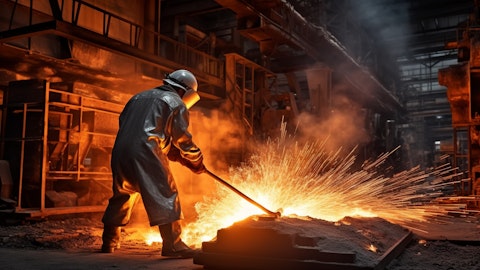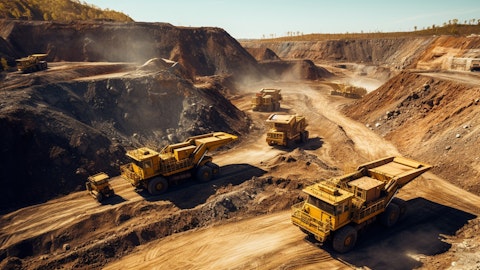And we’re also almost reaching the end of our sales negotiations as well. So including Argentina, our long-term purchasing agreements are almost at conclusion point. On profit and loss, because lithium prices have fallen, I know that you’re all very concerned. This morning, Fastmarkets said $17,530 spodumene was $850. So PPLS stage 1, which completed last year by the fourth quarter of this year, we hope it will turn to black. By next year, we will begin to definitely hit black ink. Yes, lithium prices have fallen. But even at this rate, we are still seeing operating profit at 2 digits. And because we are linked to the benchmark price and formula, when lithium prices fall, then other prices also tend to fall. And as a result, we are able to maintain our operating margin relatively.
Spodumene was $850 this morning. This is Australian spodumene and they’ve hit the highest point. It’s — I believe the production cost is $800 to $900. So for small-scale miners, for example, in Western Australia, because spodumene prices have been falling, some of them have had to close business. And there are other parts of Australia, where we’re seeing small-scale miners closing business as well. Liontown is another region, Albemarle. Australia Phase 4 lithium hydroxide plant is being delayed on their side as well. So lithium price, based on the current spodumene price, I think, have hit almost the rock bottom. Lithium production cost is compared to even Chinese companies, POSCO does not pale in comparison. So if lithium price falls, spodumene price falls as well, and that’s what gives us the leeway to generate margin.
So this market structure for battery-grade materials, we are anticipating about a 5% to 10% oversupply in the next 2 years to 3 years. So in the lithium market, we will begin to see some restructuring of smaller-scale producers. But from a long-term perspective, we believe we are still very competitive. That concludes my response.
Ki-Seop Jeong : My name is Jeong Ki-Seop. I am the CSO. Among your questions, you asked about the leadership change at POSCO Holdings. And so will the leadership change impact our growth strategy in the rechargeable battery materials business? So we are devising strategies and we have phased management plans. POSCO Holdings since it acquired the Salt Lake in Argentina, we have planned 2 phases, each producing well, the capacity to produce 25,000 tonnes. And so we are very close to actually producing lithium from these acquisitions. By 2025, we will be expanding a lot more. But come the end of 2025, we will begin to turn profits. And we believe we were able to make these decisions, bold decisions, thanks to our investors and shareholders.
So we have mid- to long-term strategies, and these are based on various supplies and orders as well. So even if there is a leadership change on the investments that have already been executed or those that await to be executed, there will not be a dramatic change in direction. And definitely, we will not be abandoning any of these plans. However, there could be some short-term changes, environmental change, and whether that will lead to significant risk, we have mechanisms in place, regular meetings to keep that in check. This year, we also will see another presidential election in the United States. So these will impact our business as well. So we are keeping eyes and our antennas up on all of these factors. Our basic strategy is to enhance our shareholder value.
And that is why before anything dramatic happens, we will have in-depth discussions with our shareholders. So yes, we are going through a succession process right now, and our growth strategy fares very prominently in who becomes the leader next. And rechargeable battery materials is a very important part of our strategy. And so I have no doubt that this will continue. And I hope you will continue to pay attention to us and continue to participate actively so that we can continue to show this very positive relationship between the company and investors. If for any reason due to these changes, some of these mid- to long-term strategies, any part of it may have to change, we are going to make sure that we communicate with you through ample discussions.
Communication with the shareholders, being transparent and enhancing and maximizing shareholder value, that is our strategy, and that will not budge.
Operator: The next question comes from Kim Yoon Sang from HI Investment Securities.
Kim Yoon Sang : This is Kim Yoon Sang from HI Securities. I have three questions as well. Business plan for different quarters in 2024 is what I’m interested in. And in steel, the projections are not bright. So how do you see your earnings panning out in 2024? Secondly, on nickel. So there are some restraints concerning nickel, but what are your price projections? And should there be a price fall? Will that impact your investment plans? Next is coking coal. Price of coking coal has been fluctuating. Because of net zero goals, I know that there were some cutbacks. But recently, I think we’re seeing an increase in demand. So any traditional strategies that you can share and changes in those strategies, I would appreciate.
Young-Ah Han : So the first question was the business plan by each business in the year 2024. So the numbers for each business will be discussed by the people who are in charge of the each business. And for the price on nickel, Mr. Lee Kyung-Sub will take over again, and for coking coal, Mr. Suh Ji-Won, in charge of raw materials office at POSCO.





